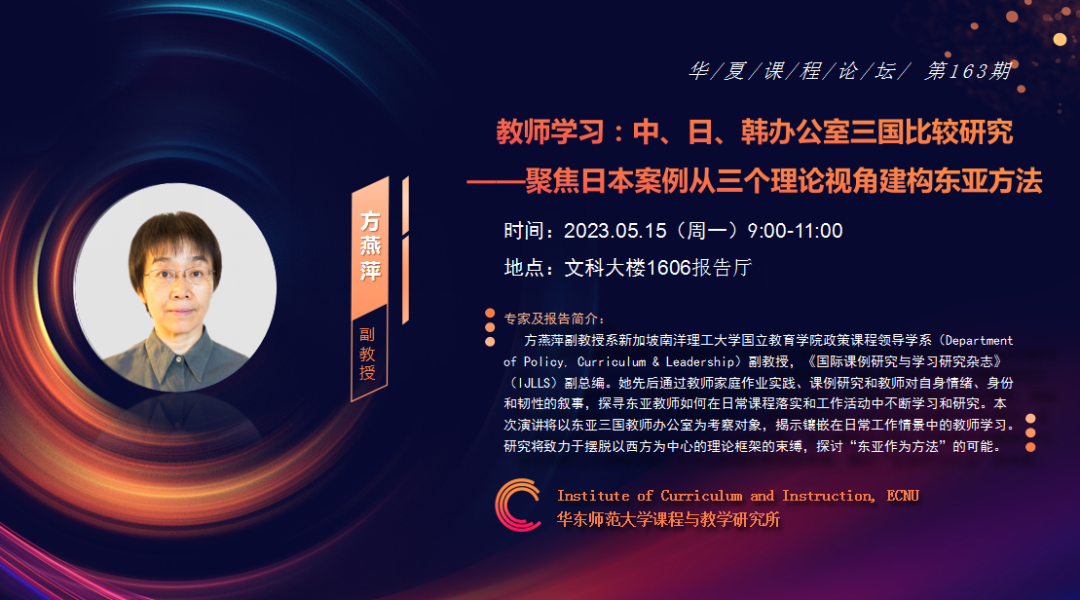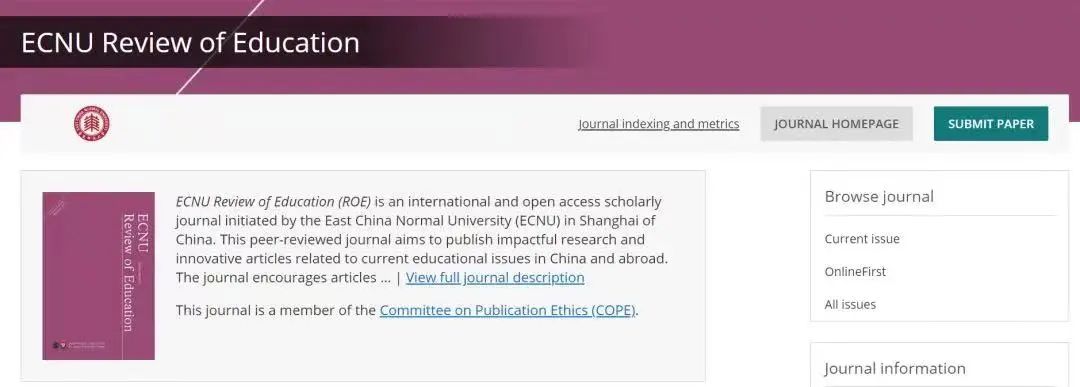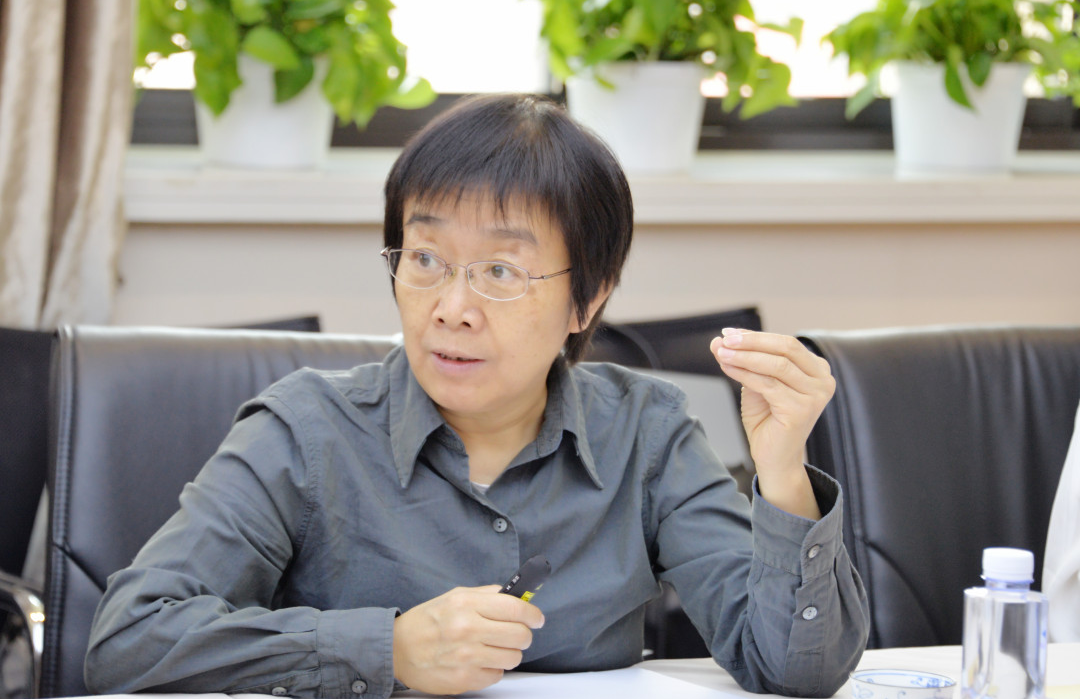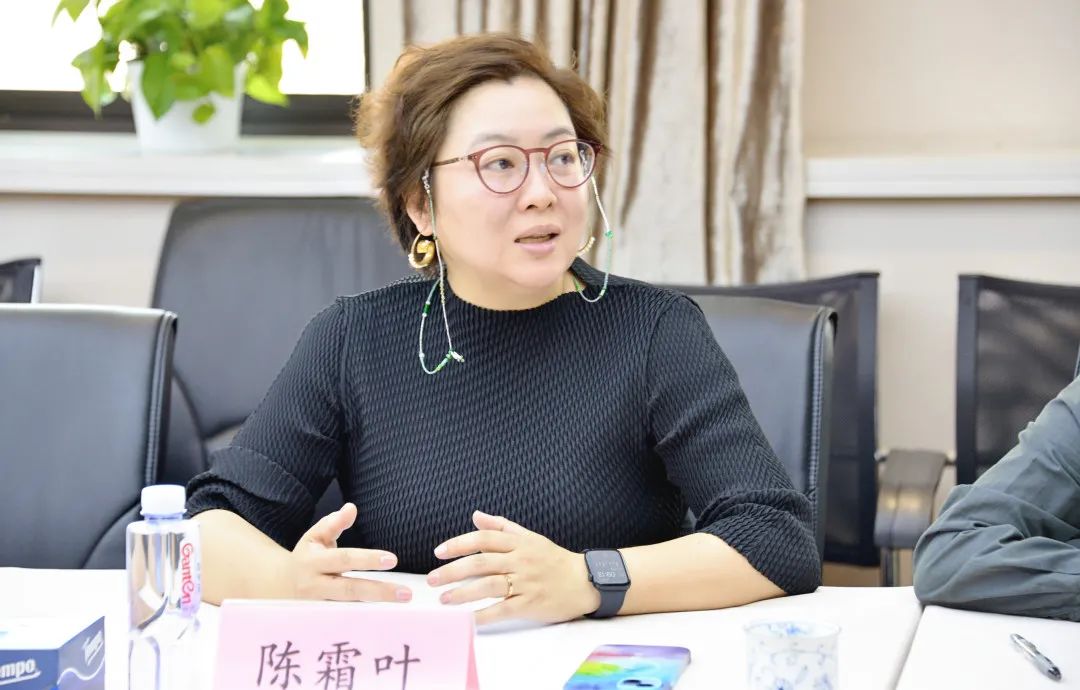ICI 163rd Huaxia Curriculum Forum ║Teacher Learning: Constructing East Asian Approaches from Three Theoretical Perspectives with focus on Japan
2023-06-01
On the morning of May 15th, Associate Professor Fang Yanping, Department of Policy Curriculum Leadership, National Institute of Education, Nanyang Technological University, Singapore, guested at the 163rd issue of Huaxia Curriculum Forum, and made a speech entitled "Teacher Learning: A Comparative Study of China, Japan, and Korea Offices - Constructing East Asian Approaches from Three Theoretical Perspectives with focus on Japanese cases". The forum was chaired by Professor Chen Shuangye from the Institute of Curriculum and Instruction, East China Normal University, and attracted many teachers and students to participate in the study and discussion.

Associate Professor Fang Yanping took the teachers' offices of schools in the three East Asian countries, especially Japanese schools, as the research object, revealing the teacher's learning embedded in the daily work situation, emphasizing the two parallel development paths in the research process:
First, the change of the theoretical framework, that is, from the long-term study of educational practice in East Asia through the theory of social culture and cultural history, to the "contextualism" developed by Japanese scholars Hamaguchi and others in the past two years, to the recent Thomas Kasulis’s East Asian cultural philosophy to study East Asian educational practice——gradually get rid of the shackles of the Western-centered theoretical framework, and move toward exploring and constructing "East Asia as a method";
Second, it reveals the change of the researcher's subjective consciousness along with the sequential change of the theoretical framework, that is, from "indulgence" to "epiphany" to "qualitative change".
Associate Professor Fang Yanping started with this research topic: When she was studying a “teacher learning” course as part of PhD at MSU, She was surprised by the lonely image of teachers in the context of individualism and teacher autonomy advocated in literature by a huge number of American scholars, which is very different from the cultural traditions of East Asian that emphasize teacher cooperation. Thus, she began to study the East Asian teacher's office as a space for teachers to work and learn collaboratively. Together with several Japanese and Korean co-workers, in the summer vacation of 2002, she collected field observation and interview data from teachers’ offices in Shanghai, Japan and South Korea respectively, and carried out a comparative study of the three countries, and made a thesis presentation at the 2003 AERA and CIES conferences. Nearly 20 years later, in 2019, she and another Chinese colleague working in a Japanese university returned to the field observation in the Japanese teacher's office, and participated in the research group lead by Prof Keita Takayama from Kyoto University in Japan in 2020-2022 as ECNU-ROE "East Asia as Method Special Issue". This report is based on articles written for that special issue.

Associate Professor Fang Yanping first examined the cross-border work-study activity system around responsibilities and roles formed by teachers in their daily formal and informal interactions under the support of spatial layout, time allocation and tool (resource) intermediary in Japanese teachers' offices from the perspective of activity theory. Then she turned to the perspective of Japanese colleagues, which were "contextualism" and "relationship-centric", highlighting from the meaning composition of the five Japanese Kanzi that there is no individual operating as a single individual in Japanese organizational culture, and every Japanese is born to be combined with others into a solid molecular structure to work together to achieve the highest goal of "benevolence" similar to Confucianism. This perspective examines the day-to-day activities of office colleagues and administrative leaders under one roof, noting that they collaborate spontaneously to meet the needs of students and the goals of the school. This framework composed of Japanese characters and the thought centered on "benevolence" inspired her to return to, re-understand and learn traditional Chinese culture. Finally, based on Kasulis's discussion on the intimacy orientation value in East Asia, which broke the cognitive system of Western activity theory for understanding the world and the relationship between people with binary opposition, it can be seen that office space design is not to promote transboundary communication because the concept of boundaries does not exist in the Japanese office itself. It pointed out that its design and operation are to maintain and strengthen the relationship between employees and each other, and to promote communication and learning in the daily formal and informal interactive practice of teachers; thus , the daily repetitive practice of incarnation, visualization, and physicalization of actions, language, and emotions in the office comes alive.
By telling the story of the Japanese teacher's office from the above three perspectives, the research begins to break through the perspective of the theoretical framework dominated by the West, explore "East Asia as a method", and re-examine the office to understand the social and cultural practices of East Asian local education.
In the end, Associate Professor Fang Yanping concluded that we should not simply view East Asian teachers’ office as a mechanism of social practice and activity system from the cognitive perspective of binary opposition, but regard it as a recursive human practice based on the overall epistemology of East Asia; In the collaboration between colleagues and the interaction with the environment, personal practical knowledge is formed in continuous educational practice and research student learning, caring for and responding to each other's present and future needs. She called on researchers not only to consciously get rid of the dominance of Western centralized theoretical frameworks, but also to construct theories by highlighting the personal experiences of research participants and students, so as to avoid being dominated by any single theoretical framework in research and teaching.

Associate Professor Fang Yanping's research on the method of constructing East Asia based on the case of the Japanese teacher's office aroused strong interest in further questions and discussions among the teachers and students present. In the follow-up question-and-answer session, the participating teachers and students conducted discussions and discussed issues such as "how to spread Chinese teaching and research culture based on research and construct Chinese discourse", "how to obtain access permission in research" and "how to realize the transfer of research perspectives in research".
At the end of the lecture, Professor Chen Shuangye wittily compared the three states of Wang Guowei's life to associate professor Fang Yanping's hard work and harvest in this research for more than 20 years, and pointed out that "East Asia as a method" is a kind of courage and standpoint, and expressed the expectations of Associate Professor Fang Yanping on the follow-up research on the teacher's office.
